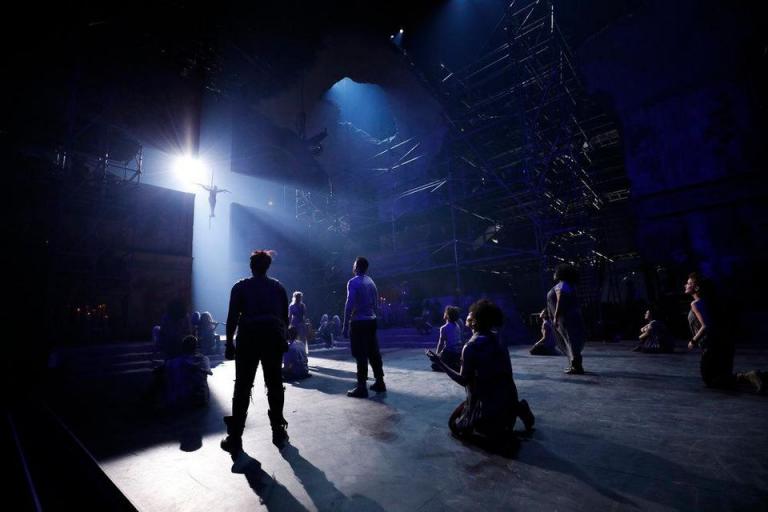
Before Easter, I gave my hot take on whether to see NBC’s live musical, Jesus Christ Superstar.
Hopes were high, and although I couldn’t see the musical live (since I was on holiday with my friend, feasting after the fast), I was heartened by seeing all my cynical theatre friends gush over how great the telecast was.
Still: as mentioned before, I do not care for this particular musical as a piece of art. I sought a professional opinion first.
The Judas Kiss
On Laughing Monday, I hosted a tea with a dear friend in NYC—a theatre critic whose parents happen to be musical theater scholars. Which is to say, a Woman Wot Knows Her Stuff. I asked her what she thought and how the telecast held up against other versions she had seen.
She gave me her opinion: John Legend looked sleepy but sang beautifully; Sarah Bareilles was fine; Pilate was forced to wear “Greatest Showman punk,” and Brandon Victor Dixon as Judas stole the show.
“This is what he did with Judas,” my friend explained. “He gave a restrained performance, a slow-burn, a slow revelation from ‘I don’t understand what You’re doing’ through to ‘How did we get to this?’ It’s the same slow-burn he gave his Aaron Burr in Hamilton.” (I’m friends with someone who’s seen Hamilton. More than once.)
“But did it work?” I pressed.
My friend shrugged. “Better than it should,” she replied. “I find the director to be a little cold and impersonal. But the fact that the musical’s sung-through, so that there aren’t any awkward and poorly rehearsed acting scenes worked greatly in its favor. It was good. It was better than it should have been.”
Armed with such a wide range of opinions, I finally turned to Hulu to watch the show myself.
Caveat Spectator
When reviewing any work of art, you have to first take it for what it is—and not what you want it to be.
If you hate fantasy novels, then even though Tolkien is beloved, he’s not for you. And no matter how you carp, he won’t get rid of a single dwarf to please you. Nor should he.
So it is with this musical. If you don’t like modern musicals, or rock operas, funk music, punk clothing, or anything except overtly reverent treatments of the Bible, then this musical is not for you, and it’s no use you wishing the musical were something other than what it is.
If, however, any of the above intrigues you, then read on!
A Sacred and Secular Art
From the first moment of the teleplay, Jesus Christ Superstar tells us what world we’re in. This is an Neverwhere and Everywhen. A world where the heat of 33 AD Jerusalem is intermingled with a faded Christian fresco, several stories high, flanked by metal scaffolding. A world where a punk-haired musician, shredding his guitar in a virtuoso solo is surrounded by a multi-cultural cast undulating to some brilliant choreography while a live audience loses its mind on two sides of a long stage.
The conceit works.
The music, which out of context grates on the ear, is here justified by the Neverwhere and Everywhen setting—and even better, I believe was given a tweak in the orchestration and arrangement to suit a modern ear.
As promised, Brandon Victor Dixon as Judas is absolutely heartbreaking in his role: beginning with a sense of prowl, the perpetual outsider, wary of Jesus’ popularity and his rabbi’s propensity to hang out with the rabble. As he progresses towards taking the blood money, the musical gives him profound silence—a silence that Dixon takes and owns with ease—as Judas loathes himself for giving in to the thirty pieces of silver. Silence follows him, as well, into the kiss in Gethsemane. A silence that is painfully broken as he sobs and howls his way through his suicide, harrowingly conceived, as he begs whether the Man he betrayed could still love him. A howl that is turned to pure hatred as he condemns Christ for being his murderer. A howl that, I imagine, too many feel when despair overtakes them and they think themselves far, far from the wounded Heart, believing there to be no room for them in His bleeding side.
John Legend as Jesus acquits himself admirably in song, although his acting still leaves much to be desired. However, since this is staged as a concert, the sense of aloofness does not wholly negate the power of the production. Sarah Bareilles acquits herself well, and I found her particularly moving towards the end of the musical where her Mary Magdalene begins to wonder whether the “man” she loved might be More than she’d dared to believe. Alice Cooper in his cameo as Herod is…Alice Cooper in a cameo. (Although there’s an adorable cut away to a member of the audience who is having a religious experience seeing Alice Cooper live.)
Keep an eye out for the actors playing the basso profundo Caiaphas and his tenor henchman, as well as the pitch-perfect Pontius Pilate, all three of whom give bravura performances both vocally and emotionally. The chorus is also to be commended: every single one of them energized without falling into mugging for the camera. The choreographer, Camille A. Brown (Once On This Island), who is likely to be owed more thanks than the director, dazzles and interprets the jarring music gorgeously…which means that I wasn’t even angry at “What’s the Buzz,” and the second half of “The Temple” had me positively weeping at the pain and beauty.
Commendation must also go to the orchestra, scattered throughout the scaffolding—a modern convention and very cool, but hell to coordinate for the conductor. The camera crew also acquitted themselves well (although a concert is easier to film than a Staged Play, since a certain level of sloppiness is permissible). However, the shots of Judas alone, and both deaths were extraordinary, well-executed and effective. The audience shouting, the driving music, and an enormous chorus sometimes muffled intelligibility of lyrics—but since these are Tim Rice lyrics, you aren’t missing all that much. And the actors all convey the sense of the song, whether one catches every word or not.
In short, artistically, this Jesus Christ Superstar scores. But how about that theology?
The Majesty and the Mystery
I will confess here that I have only ever seen Jesus Christ Superstar once.
And it was…not a good production.
So bad, in fact, that I remember almost nothing of the blocking which, if you know me, if not a good sign that your show did well. My main take away was that I felt the show was artistically painful, and—at least in this production—faintly blasphemous. (If memory serves, that production had Jesus super into Mary Magdalene, and clearly played up the sense that Jesus Himself was just a rock star that had gotten in over his head. Nothing divine about Him at all.)
My take-away from NBC’s production was vastly different. They clearly put the focus on the human point of view of this mysterious man—possibly God, possibly a human Messiah, possibly a rock star in over his head, undeniably charismatic but not…surely not…not actually God Himself? Could He be?
Yet as the show progressed, it became clear that the production was also interested in what a mess we humans make of our lives, even as God walks among us. The fickleness of the crowd, only glimpsed in the Palm Sunday readings, is here on full display as the chorus transforms from a crowd wishing to be kissed by Jesus, to an orgy in His Temple, to the sick begging to be cured, to paparazzi gloating over His demise. Watching this production, one is forced to ask where we would be—really, where would we be—if we were there when they crucified Our Lord. Even the best of us, perhaps called to be Apostles, congratulate ourselves before Gethsemane and then fall asleep, only waking long enough to deny and to doubt.
Two moments in particular stand out theologically: the riff of trumpets at Christ’s entrance thrilled in a way only a great production can transcend thought to go right into your spine and say: “Here is something more.” Bookended with a spectacular and sacred crucifixion, entirely appropriate to the milieu and worth not being spoiled, except to say—whether they intended to or not—for the Catholic, there’s a glimmer of the Eucharist enthroned in His death. Even as, in a blue light and in silence—for a noisy musical, they do well with silences—one by one we fickle unbelievers sink down in awe and beauty to our knees and simply Are with Him.
The camera lingers on Mary Magdalene, and the unspoken sense with an unseen Longinus, that we did not see Who He was while He was with us. We were so caught up in the wild and whirling and weird of our world, that we almost missed the only Man at all.
Highly, highly recommended.
 Photo credit Patrick Randak/NBC
Photo credit Patrick Randak/NBC
Want to tell the Pop Feminist what to review next? Become her patron for as low as $1/month on Patreon!












